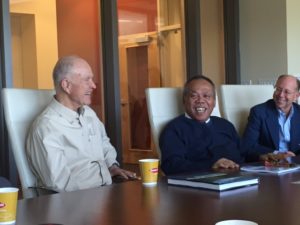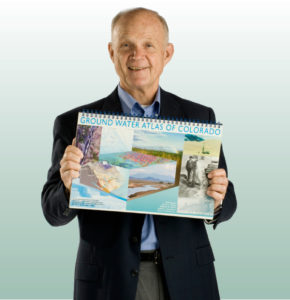
Editor’s note: The newly formed Provost’s Council for Engagement is made up of a dozen faculty members representing all eight colleges and Morgan Library. Council members serve as champions for advancing the practice and recognition of engaged scholarship as fully embedded within CSU’s core teaching, research and service missions. Each month we are profiling a different member of the Council, who will in their own words help showcase the diversity of engaged scholarship across campus, as well as the impact of this work on communities and the university. So far, two members have been profiled – Martin Carcasson and Christine Fruhauf.
This month we meet Neil Grigg, professor in the Department of Civil and Environmental Engineering, Walter Scott, Jr. College of Engineering. Grigg’s research focuses on developing engineering and management systems for water resources and infrastructure, which includes making them more resilient to natural disasters and secure against terrorist attacks. He focuses on the interdependency among electrical, transportation and water systems in such disasters. Long-term, Grigg would like to focus on the new technology and methods, as well as the teaching of this knowledge to students, in order to better deal with these problems in future generations.
Grigg discusses the concept of “faculty engagement,” its impact on students, and what he hopes the Council can accomplish.
What, in your opinion, is “faculty engagement”?
“To me, faculty engagement is the application of knowledge to benefit society through interactions among people. A lot of institutions and businesses apply knowledge to benefit society, but faculty are able to make unique contributions by seeking out people and problems that are underserved or ignored by businesses and government. A few areas that come to mind are international development, environmental justice and water resources management.”
 How have you, your program or students benefitted from what you have learned as an engaged faculty member? In addition, has there been any sort of reciprocity with the communities outside of CSU that you have been involved with?
How have you, your program or students benefitted from what you have learned as an engaged faculty member? In addition, has there been any sort of reciprocity with the communities outside of CSU that you have been involved with?
“I use case studies of real problems in my courses about infrastructure and water resources. These real problems are much more complex than the ones you find in regular textbooks, and the students and I benefit from experiences I have had with the real problems, whether in government, business or volunteer roles.
My research is mostly applied, with a special target group being public organizations that manage infrastructure and water resources. Often staff members of these organizations express appreciation for the work done by students and faculty members.”
Why are you involved with this Council, and how does it related to your work or research?
“I am excited that CSU has created the Council and I hope that it will be able to elevate awareness among faculty and the public of the tremendous contributions the university can make. While some think the ‘land-grant tradition’ is not as relevant as it used to be, to me it’s still alive and needs to be applied to the many complex issues of today.”
What do you hope the Council is able to accomplish?
“If the Council is able to raise awareness among the faculty of this important area of work and get administrators to appreciate faculty contributions in engagement, this will be a success. One indicator would be if, within a couple of years, people would say, ‘Wow, that Council really moved engagement into the front row of university work!’”
Any final thoughts on the Provost’s Council for Engagement?
“Higher education is facing a lot of challenges today, and if the Council can help faculty, students and the public understand more about the full value of university work, it will make a strong contribution, not only to higher education but also to the nation.”